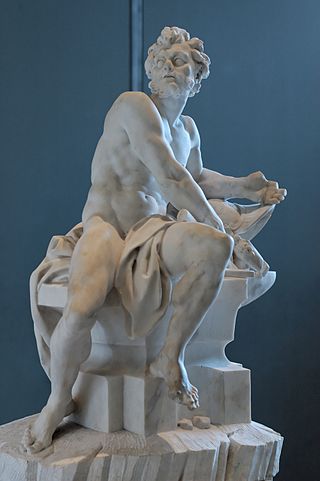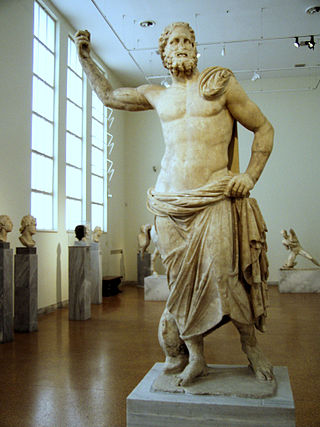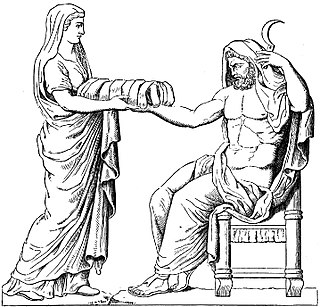Premise
Depictions of gods

This show is well known for its unique depictions of the Greek gods. Most were shown as gigantic (approximately 10–12 feet tall) humanoids possessing immortality, the abilities to fly and teleport, supernatural powers of a magical nature (as opposed to cosmic), and the ability to alter their appearances at will; including reducing themselves to the size of a typical human, as well as completely altering their looks, voices, and even gender. When in their natural form, an echo would accompany their voice whenever they spoke.
Instead of classic attire resembling that of human nobility often employed during Hellenic times, the Olympians were instead depicted as wearing brightly colored clothing more typical of a warrior's formal attire, the exceptions being Hera, Demeter, and Hephaestus.
Between the first and second seasons, the depictions of several gods changed. Hades' attire was slightly altered. Persephone aged from a teenage-looking young girl to a grown goddess. The most significant changes, however, were to Aphrodite and Athena; the former shifted from a giggling pencil-thin schoolgirl-like teenager, to a conniving fully mature armor-clad lust goddess, with an entirely different voice and manner of speech as well. Athena was altered from a blonde in monotonous silver armor; to a brunette cloaked in blood-red dual-split dress with matching cape, plus golden shin guards and arm-bands in addition. Despite the complete change in depiction, her voice did remain the same.
Featured Gods
- Zeus – King of the gods, ruler of Olympus, and god of the sky, justice, thunder, and lightning. He is the father of Hercules and Perseus.
- Hera – Queen of the gods and goddess of the sky, marriage and childbirth.
- Hades – God of the Underworld, the Dead, wealth and burial. He is the husband of Persephone.
- Demeter – Goddess of fertility, grain, agriculture and harvest. She is the mother of Persephone.
- Poseidon – God of the sea, horses and earthquakes. He is the father of Pegasus and Theseus.
- Hermes – Messenger of the gods; god of travelers, trickery, commerce, messages, international trade, wit, thieves, speed and invention.
- Athena – Goddess of wisdom, battles, crafts, battle tactics, warriors, handcrafts and reason. One of only three virgin goddesses.
- Ares – God of war, murder and bloodshed. Because of his role in mythology, his role in the show was limited.
- Apollo – God of light, music, prophecies, poetry, medicine, truth, archery and (in Hellenistic myths) replaced Helios as god of the sun. He was to become known as "Phoebus Apollo". He is the twin brother of Artemis.
- Artemis – Virgin goddess of the hunt, wilderness, virginity, fertility, children, childbirth and wildlife. In Hellenistic myths, she replaced Selene as goddess of the moon. She is the twin sister of Apollo.
- Hephaestus – The Gods' Blacksmith; god of the forge, fire, metalworking, volcanoes, arts and crafts.
- Aphrodite – Goddess of love and beauty. Formally known to be the most beautiful of the goddesses.
- Dionysus – God of wine, intoxication, mysteries, drama, revelry and disorderly conduct. Dionysus is the only demigod to have the divinity of an Olympian. Replaced Hestia as the 12th pantheon member.
- Helios – The Hellenic sun god. His role was later usurped by (Phoebus) Apollo in Hellenistic myths.
- Eros – God of lust and infatuation. The son of Aphrodite.
- Persephone – Goddess of Spring and Queen of the underworld. She is the daughter of Demeter and the wife of Hades.
Gods who made cameo appearances
- Pan – God of shepherds and rustic music.
- Hebe – Goddess of youth, cupbearer to the gods; daughter of Zeus and Hera.
- Hecate – Goddess of night/nighttime, sorcery/magic, witchcraft, mystery, crossroads, the Moon, and the horrors of nature. She is the mother of Scylla.
- Zephyrus – God of the West Wind.
- Boreas – God of the North Wind.
- Notus – God of the South Wind.
- Eurus – God of the East Wind.
- Achelous – A River God who battled Heracles/Hercules.
Featured Titans
- Alcyoneus – In this show, Alcyoneus is featured as a Titan King despite the fact that he is actually a Gigantes and not a Titan. The actual King of the Titan was Cronus who was the father of Zeus, Poseidon, Hades, Hera, Demeter, and Hestia.
- Atlas – Atlas holds up the sky.
- Epimetheus – Brother of Prometheus and the deity who brought animals into the world.
- Prometheus – Titan who defied Zeus by giving fire to mankind and was punished by being chained to a mountainside and tormented by eagles. After humanity proves its worth, Zeus forgives Prometheus and has him released at the hands of Hercules.












